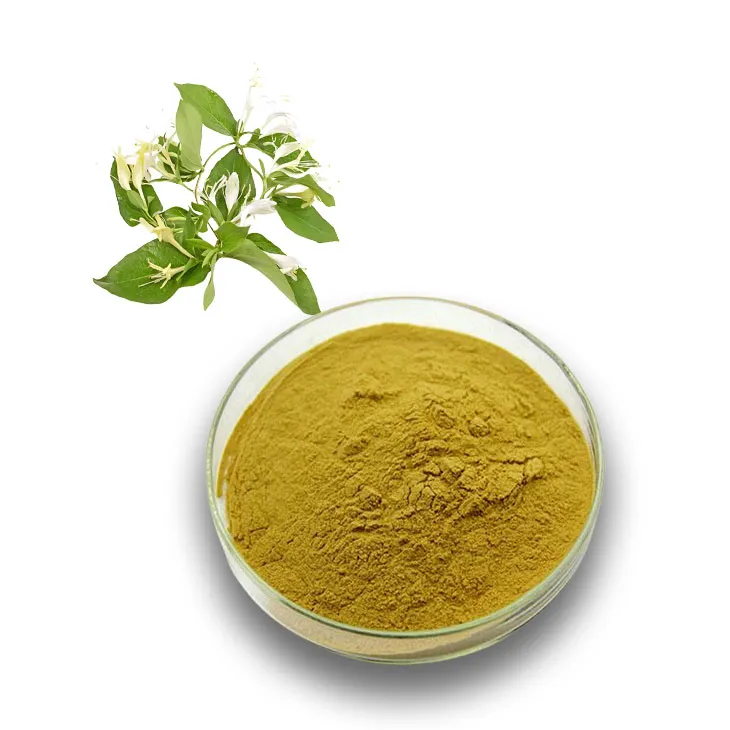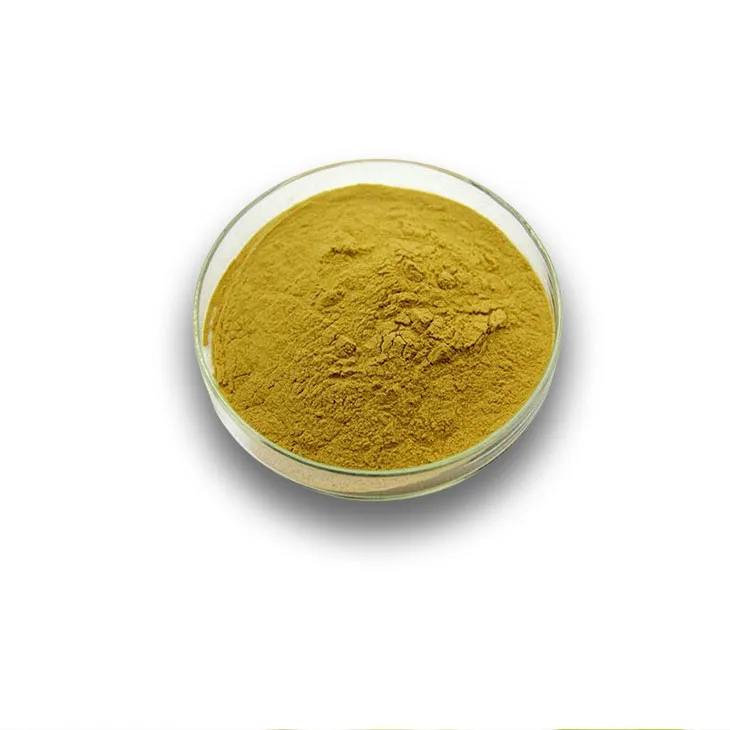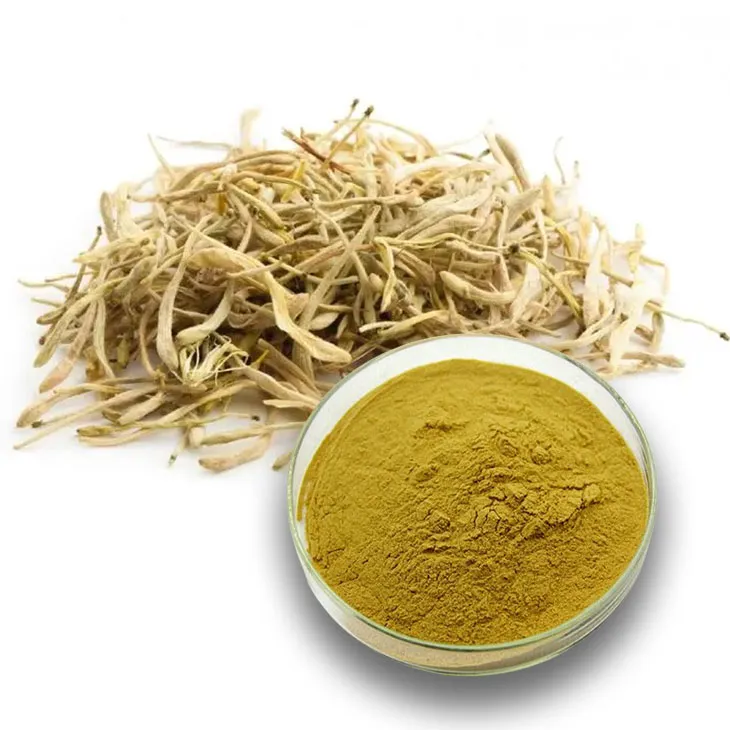- 0086-571-85302990
- sales@greenskybio.com
Use honeysuckle pollen to prevent diseases and strengthen immunity.
2024-11-12

1. Introduction to Honeysuckle Pollen
Honeysuckle, a well - known plant in traditional medicine, has been used for centuries in various cultures for its medicinal properties. Honeysuckle Pollen, in particular, is a rich source of nutrients and bioactive compounds that offer numerous health benefits. It is collected by bees as they forage on honeysuckle flowers, and it contains a complex mixture of proteins, vitamins, minerals, and antioxidants.

2. Nutritional Composition of Honeysuckle Pollen
Proteins: Honeysuckle pollen is a significant source of high - quality proteins. These proteins are essential for the growth, repair, and maintenance of body tissues. They also play a crucial role in the production of enzymes, hormones, and antibodies, which are vital for various physiological functions in the body.
Vitamins: It contains a variety of vitamins, such as vitamin A, vitamin C, and several B - vitamins. Vitamin A is important for vision, immune function, and skin health. Vitamin C is a powerful antioxidant that helps protect cells from damage, boosts the immune system, and aids in the absorption of iron. B - vitamins are involved in energy metabolism, nerve function, and the production of red blood cells.
Minerals: Honeysuckle pollen also provides essential minerals like calcium, magnesium, potassium, and zinc. Calcium is necessary for strong bones and teeth, muscle function, and blood clotting. Magnesium is involved in over 300 enzymatic reactions in the body, including those related to energy production and muscle relaxation. Potassium helps regulate fluid balance, nerve impulses, and muscle contractions. Zinc is crucial for immune function, wound healing, and the sense of taste and smell.
Antioxidants: The presence of antioxidants in honeysuckle pollen is one of its most remarkable features. Antioxidants such as flavonoids and phenolic compounds help neutralize free radicals in the body. Free radicals are unstable molecules that can cause oxidative stress, which is linked to various diseases, including cancer, heart disease, and neurodegenerative disorders. By scavenging free radicals, antioxidants in honeysuckle pollen can help prevent these diseases and slow down the aging process.

3. How Honeysuckle Pollen Strengthens Immunity
3.1 Stimulating the Immune System
The nutrients in honeysuckle pollen, especially the proteins and vitamins, play a vital role in stimulating the immune system. Proteins are the building blocks of antibodies, which are the body's defense against foreign invaders such as bacteria and viruses. Vitamins like vitamin C and zinc are also known for their immune - boosting properties. Vitamin C helps increase the production of white blood cells, which are the key components of the immune system. Zinc is required for the proper functioning of immune cells and helps in the development and activation of T - cells, a type of white blood cell that plays a central role in immune responses.
3.2 Anti - Inflammatory Effects
The antioxidants in honeysuckle pollen have anti - inflammatory effects. Inflammation is a natural response of the body to injury or infection, but chronic inflammation can lead to various diseases. The flavonoids and phenolic compounds in honeysuckle pollen can help reduce inflammation by inhibiting the production of inflammatory mediators such as cytokines and prostaglandins. By reducing inflammation, honeysuckle pollen can help the immune system function more effectively and prevent the development of chronic diseases.

4. Disease Prevention with Honeysuckle Pollen
4.1 Respiratory Diseases
Prevention of Colds and Flu: The immune - boosting properties of honeysuckle pollen can help prevent colds and flu. By strengthening the immune system, it makes the body more resistant to viral infections. Additionally, the anti - inflammatory effects of honeysuckle pollen can help reduce the severity and duration of respiratory infections if they do occur.
Allergy Relief: Paradoxically, honeysuckle pollen can also be beneficial for those with respiratory allergies. Although it is a type of pollen, it contains compounds that can modulate the immune response in allergic individuals. It may help desensitize the immune system to allergens, reducing symptoms such as sneezing, coughing, and itchy eyes.
4.2 Cardiovascular Diseases
Lowering Cholesterol: Some studies suggest that the antioxidants in honeysuckle pollen can help lower cholesterol levels. High cholesterol is a major risk factor for cardiovascular diseases, including heart attacks and strokes. By reducing cholesterol, honeysuckle pollen can help improve heart health and reduce the risk of these diseases.
Antithrombotic Effects: Honeysuckle pollen may also have antithrombotic effects, which means it can help prevent the formation of blood clots. Blood clots in the arteries can lead to heart attacks and strokes, so by preventing clot formation, honeysuckle pollen can further protect the cardiovascular system.
4.3 Cancer Prevention
The antioxidants in honeysuckle pollen can play a role in cancer prevention. Free radicals can damage DNA, which is a precursor to cancer development. By scavenging free radicals, the antioxidants in honeysuckle pollen can help protect DNA from damage and reduce the risk of cancer. Additionally, some of the bioactive compounds in honeysuckle pollen may have anti - cancer properties that can inhibit the growth and spread of cancer cells. However, more research is needed in this area to fully understand the potential of honeysuckle pollen in cancer prevention.

5. How to Incorporate Honeysuckle Pollen into Your Diet
1. Honeysuckle Pollen Supplements: One of the easiest ways to consume honeysuckle pollen is through supplements. These are available in capsule or powder form. When choosing a supplement, it is important to ensure that it is from a reliable source and of high quality.
2. Adding to Food and Beverages: Honeysuckle pollen can be added to a variety of foods and beverages. For example, it can be sprinkled on top of yogurt, oatmeal, or smoothies. It can also be added to tea or honey for a unique and healthy flavor. When adding honeysuckle pollen to food or beverages, start with a small amount and gradually increase the quantity according to your taste preferences.
6. Precautions and Considerations
1. Allergies: Although honeysuckle pollen may have benefits for some people with allergies, it can also cause allergic reactions in some individuals. People with known pollen allergies should be cautious when using honeysuckle pollen and consult a doctor before starting any new supplement.
2. Purity and Quality: Ensure that the honeysuckle pollen you consume is pure and of high quality. Poor - quality pollen may contain contaminants or have reduced nutrient content. Look for products that are tested and certified for purity and quality.
3. Dosage: There is no established standard dosage for honeysuckle pollen. It is important to follow the recommended dosage on the supplement label or consult a healthcare professional for appropriate dosage guidelines, especially if you have any underlying health conditions.
7. Conclusion
Honeysuckle pollen is a natural and potentially powerful tool for preventing diseases and strengthening immunity. Its rich nutritional composition, including proteins, vitamins, minerals, and antioxidants, offers a wide range of health benefits. However, like any natural remedy, it should be used with caution, taking into account individual allergies, purity, quality, and dosage. With further research, honeysuckle pollen may prove to be an even more valuable addition to the arsenal of natural health products in the future.
FAQ:
Q1: What are the main components in honeysuckle pollen that can prevent diseases?
Honeysuckle pollen contains various bioactive components such as flavonoids, polysaccharides, and amino acids. Flavonoids have antioxidant properties which can help in neutralizing free radicals in the body that are often associated with the development of diseases. Polysaccharides may play a role in modulating the immune system, enhancing its ability to fight off pathogens. Amino acids are essential for the proper functioning of the body's cells and can contribute to overall health and disease prevention.
Q2: How does honeysuckle pollen strengthen the immune system?
The components in honeysuckle pollen interact with the immune cells in the body. For example, the polysaccharides can stimulate the activity of macrophages, which are important immune cells that engulf and destroy foreign invaders like bacteria and viruses. Flavonoids also help in reducing inflammation, which is beneficial for the immune system as chronic inflammation can suppress immune function. By enhancing the function of these immune components, honeysuckle pollen effectively strengthens the body's natural defense mechanisms.
Q3: Can honeysuckle pollen be used as a sole preventive measure against diseases?
No, while honeysuckle pollen has beneficial properties for preventing diseases and strengthening immunity, it should not be considered as the only preventive measure. A healthy lifestyle which includes a balanced diet, regular exercise, proper sleep, and stress management is also crucial. Additionally, for some specific diseases, vaccinations and proper medical screenings are still necessary. Honeysuckle pollen can be part of a comprehensive approach to maintaining good health.
Q4: Are there any potential side effects of using honeysuckle pollen?
Some people may be allergic to honeysuckle pollen. Allergic reactions can range from mild symptoms such as sneezing, itching, and skin rashes to more severe ones like difficulty breathing and anaphylactic shock in extreme cases. Also, if consumed in excessive amounts, it may cause digestive discomfort. Therefore, it is important to start with a small amount when using honeysuckle pollen and to consult a healthcare provider if there are any concerns.
Q5: How can one incorporate honeysuckle pollen into their daily routine for disease prevention?
Honeysuckle pollen can be consumed in various forms. It can be added to smoothies, yogurt, or oatmeal. Some people also take it in the form of capsules or tablets. However, it is important to ensure that the source of the honeysuckle pollen is reliable and of high quality. When incorporating it into the diet, it should be done in moderation, following the recommended dosage.
Related literature
- The Health - Promoting Properties of Honeysuckle and Its Components"
- "Honeysuckle Pollen: A Potential Natural Immune Booster"
- "Beneficial Effects of Botanical Pollens, with a Focus on Honeysuckle Pollen, on Human Health"
- ▶ Hesperidin
- ▶ citrus bioflavonoids
- ▶ plant extract
- ▶ lycopene
- ▶ Diosmin
- ▶ Grape seed extract
- ▶ Sea buckthorn Juice Powder
- ▶ Beetroot powder
- ▶ Hops Extract
- ▶ Artichoke Extract
- ▶ Reishi mushroom extract
- ▶ Astaxanthin
- ▶ Green Tea Extract
- ▶ Curcumin Extract
- ▶ Horse Chestnut Extract
- ▶ Other Problems
- ▶ Boswellia Serrata Extract
- ▶ Resveratrol Extract
- ▶ Marigold Extract
- ▶ Grape Leaf Extract
- ▶ blog3
- ▶ blog4
- ▶ blog5
-
Organic Tongkat Ali extract powder factory.
2024-11-12
-
How to make powder with ashwagandha extract.
2024-11-12
-
Rosehip extract manufacturers from China.
2024-11-12
-
The best cat's claw extract in nature.
2024-11-12
-
Chinese Dandelion Leaf Extract Suppliers.
2024-11-12
-
Mulberry Extract
2024-11-12
-
Rosemary extract
2024-11-12
-
Shikone Extract
2024-11-12
-
Saffron Extract Powder
2024-11-12
-
Peppermint Oil
2024-11-12
-
Acerola Juice Powder
2024-11-12
-
Nettle Root Extract
2024-11-12
-
Mango flavored powder
2024-11-12
-
Genistein
2024-11-12
-
Alfalfa Meal
2024-11-12





















